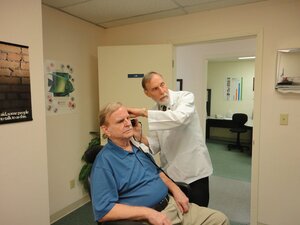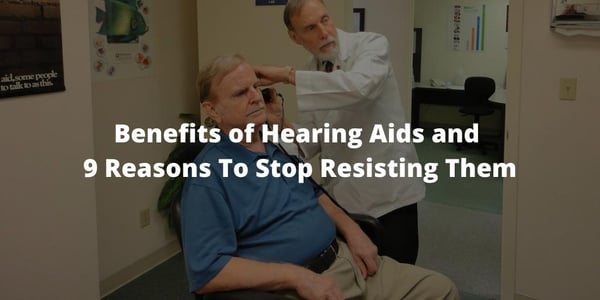Aging is a natural part of life, and along with it comes various changes in our physical abilities....
Age-Related Hearing Loss: Understanding and Managing Presbycusis
The World Health Organization estimated in 2018 that there were approximately 466 million people across the world suffering from hearing loss. That is about 6.1% of the world's total population. It is estimated that one in every three adults over the age of 65 are affected by disabling hearing loss. On top of that, the number of people affected by hearing loss is projected to reach 630 million by 2030.
Understanding Hearing Loss
Age-related hearing loss is known as presbycusis. With time, adults face more significant challenges interpreting the sounds around them. This can lead to severe difficulties in communication. Generally, this process occurs gradually over time. Age-related hearing loss results from changes in the inner ear, which could be contributed to by several factors:
- Change in the structure of the inner ear due to aging
- The sound signals from the ear not being appropriately processed in the brain
- Damage to the sensory hair cells
Hearing loss can also be partially attributed to other disorders like diabetes, the side effects of medications, smoking, and high blood pressure.
Prevention
While age-related hearing loss cannot entirely be prevented, there are ways to protect yourself from the causes of presbycusis. Avoiding exposure to loud noises is the best way to protect yourself from hearing loss. According to the CDC, "Sound is measured in decibels (dB). A whisper is about 30 dB, normal conversation is about 60 dB, and a motorcycle engine running is about 95 dB. Noise above 70 dB over a prolonged period of time may start to damage your hearing. Loud noise above 120 dB can cause immediate harm to your ears." For the times you cannot avoid noises, these actions will help to minimize hearing loss and protect your hearing for years to come:
 When you expect to be exposed to loud noised, wear earplugs or protective devices
When you expect to be exposed to loud noised, wear earplugs or protective devices - Don't increase the volume of your headphones or earbuds to excessive levels. Many smartphones alert you when you increase beyond a certain acceptable level. Don't ignore this warning.
- If you have diabetes, manage your blood sugar levels to avoid impairment of hearing
- Practice eating healthy and exercising regularly. It improves blood circulation, thereby delaying age-related hearing loss
Reading the Early Signs of Age-Related Hearing Loss
Beyond the age of 60, it is increasingly important to pay attention to the symptoms of age-related hearing loss. Hearing loss does not mean you wake up one day with worse hearing. Often, it is a gradual process that is best to catch early. Here are some signs and symptoms to watch out for:
- Needing to turn up the volume of your phone or TV higher than normal
- Difficulty distinguishing between two sounds originating from different sources
- Difficulty hearing background noises
- Inability to separate the "s" and "th" sounds
- Hearing men's voices better than women's
- Experiencing a continuous ringing in the ears throughout the day
- Having trouble listening and comprehending what others say and having to ask them to repeat their words time and again
Coping with Hearing Loss
Age-related hearing loss is a natural process. It should not be a reason to panic. With aging, you experience several changes in your body; hearing loss is just one of them. However, ignoring it can cause frustration, stress, and even depression. Below, discover tips for handling and coping with hearing loss:
 Meet with a Hearing Expert
Meet with a Hearing Expert
Consulting an expert (an Otolaryngologist) might be the best thing you can do for yourself or others experiencing hearing loss. They can provide professional advice that can prevent serious issues from occurring in the future. Based on their evaluation, they can suggest methods to delay the onset of hearing-related problems. An otolaryngologist may refer you to an audiologist to evaluate your condition and recommend using a hearing aid.
- Garner Support
Like any other troubling matter in life, friends and family can provide essential support in dealing with the problem. As the person experiencing hearing loss conveys troubles to loved ones, they can understand the situation and help overcome frustration and stress. They can certainly help cut the unnecessary noise that disrupts communication.
- Read Lips
When a person experiencing hearing loss communicates with others, it helps to focus on the speaker's lip movement. You can understand words better when you read lips. This helps overcome any gaps in verbal communication. You don't have to be an expert lip-reader either. It is easier to understand spoken language when you can see the speaker's face, rather than listening to the radio or talking over the phone. If you normally speak over the phone, consider video chatting with tools like Zoom, instead!
 Look into Hearing Aids
Look into Hearing Aids
There are many great options for hearing aids. If hearing loss is frustrating and makes it difficult to communicate, speak to a professional about hearing aid options.
Psychological Effects of Hearing Loss
Hearing loss may be a physiological change in the body. However, it can cause psychological side effects.
- There could be feelings of being inadequate, unintelligent, or embarrassed
- Distraction in communication can lead to trouble in thinking clearly, thereby feeling left out
- Inability to manage relationships with loved ones and at the workplace due to lack of proper communication
Communicating with Persons Experiencing Hearing Loss
If a loved one is experiencing hearing loss, there are several things you can do to help make the communication easier:
- Cut the background noise to avoid requiring extra effort to communicate
- Speak clearly
- Speak slowly
- Remember that speaking loudly does not mean that you have to shout
- Use non-verbal ways to aid your communication. This helps the listener to understand your message by covering up the vocal gaps
- Wherever possible, avoid excessive use of "s" and "th" sounds
If you are concerned about your hearing loss, the best thing to do is visit a professional. If a loved one is suffering from hearing loss, we hope these tips help make it easier for you to communicate and understand what he/she may be going through.
Let us know in the comments below - what has been most helpful for you or a loved one to continue communicating effectively despite hearing loss?
Click here to learn about the top activities for people suffering from hearing loss!







